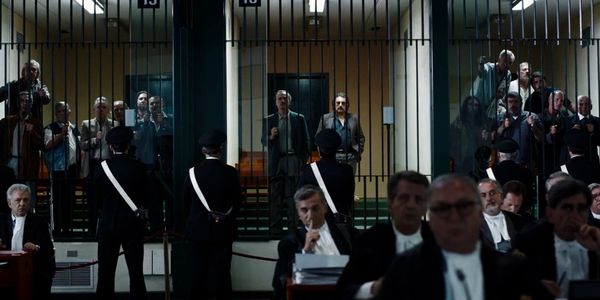THE TRAITOR: This Tragedy Of Ours

Soham Gadre is a writer/filmmaker in the Washington D.C. area.…
Hollywood’s tendency to sensationalize serious political and cultural problems in other countries becomes the most jarring and obvious when we’re confronted with the origin country’s depiction of their own problems. The most egregious cases of this, of course, are stories from the global south, but even European countries generally have a much different story to tell about their own histories and tragedies than Americans do. Take for example movies like Come and See or The Cremator, which deal with war, apocalypse, and fascism on a much more philosophical and disorientating scale than the medicinal way in which Hollywood would present it. Hollywood is really good at depicting the “what” rather than the “how” and the “why”.
The Mafia Legal Drama
Most of my friends and colleagues who grew up watching movies about the mafia will find Marco Bellocchio’s The Traitor to be much more procedural than anything they had seen before depicting the cosa nostra. For Italy, the mafia is not a glorious underdog immigrant story of survival and the protection of a ‘way of life’. It is a menace and one comprised of individuals who operate as a political faction that specializes in bullying and protection in equal measure (the former qualifying the latter) for the residents of Sicily.

A true story following the life of Tommaso Buscetta (Pierfrancesco Favino) after his departure from Italy to Brazil, and subsequent life as a testifier against the Corleonesi and their crimes in what was known as the largest criminal court case in Italian history, The Traitor chooses to present mafia life at its ultimate inescapable endgame – incrimination and humiliation. It does this by presenting itself as a methodical legal-drama but that doesn’t mean it is any less fascinating about what the mafia is and what it means to be part of this culture. It reveals itself to be a reaction to the American reverence of ‘mafia’ through Buscetta’s regrets and fears.
Tearing Down the Façade
The Traitor is consciously directed in simple terms and unlike Vincere, Bellocchio is not dancing with a revolutionary life through a historical epic, he is dealing with a man coming to terms with the awful, terrible things and he plays it straight. There is no sepia tint and nostalgic milking of a Sicily that once was. There aren’t impressionistic lights and shadows harkening Coppola’s The Godfather, where it seemed everyone existed in a different plane than the rest of the world – gods and demons in a never-ending war. Bellocchio is clear that these men of cosa nostra are very much human, very much a part of society, and very much petty, whiny, immature children with a bloodlust stronger than most.

The cultural reputation of gangsters through movies has painted them in many people’s minds as sophisticates and family men whose violence and sociopathic behavior is a means to a righteous end – both familial and capitalist. The Traitor understands that these higher standards, morals, and rules of conduct are a mere tissue paper façade. The court case scenes in the film are brilliant, orchestrated like a circus show with the judge trying to lead a bunch of uncooperative clowns. Members of the mafia use every excuse in the book, like children who fake a fever to not have to go to school.
For Life
Rather than through narration and a remembrance of mafia life, The Traitor dispels the myths of cosa nostra and its constituents through testimony and the post-mafia life of Buscetta, who enters witness protection in New Hampshire following his presenting of incriminating evidence against Pipo Calo (Fabrizio Ferracane) for committing murder against his family, a crime in the legal system of course, but also a breaking of mafia code. The mafia never Tommaso and his days away from it are all consumed through living either in fear or in the guilt of the past life he lived. He tries to wash away most of the stench of his mafia life through the court trial, as a reconciliation of sins.
Though not shown in the film, Buscetta at the end of his real-life testimony eventually forgave Calo for killing his children, saying he understood “what it meant to be in the mafia”. It’s a dangerous mindset that paints a horrifying picture of what goes on behind the curtain of organized crime and the acceptance that, as Frank Sheeran says in The Irishman, “its what it is”. The term organized crime itself connotes a systemic and capitalistic way of financial success through death. It calls to wonder what exactly separates it from an economic system that preys on the weak and poor other than the fact that they kill through direct means (guns, stabbings, bombs) instead of voted-on policy.
The Traitor releases in U.S. theaters on January 31, 2020. For all international release dates, see here.
Does content like this matter to you?
Become a Member and support film journalism. Unlock access to all of Film Inquiry`s great articles. Join a community of like-minded readers who are passionate about cinema - get access to our private members Network, give back to independent filmmakers, and more.
Soham Gadre is a writer/filmmaker in the Washington D.C. area. He has written for Hyperallergic, MUBI Notebook, Popula, Vague Visages, and Bustle among others. He also works full-time for an environmental non-profit and is a screener for the Environmental Film Festival. Outside of film, he is a Chicago Bulls fan and frequenter of gastropubs.













